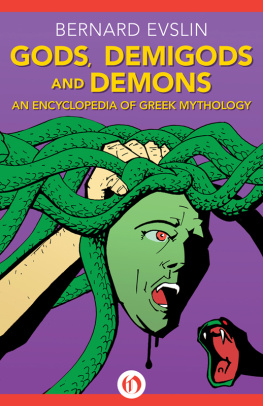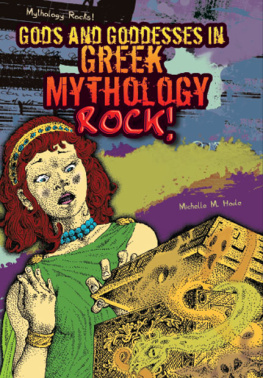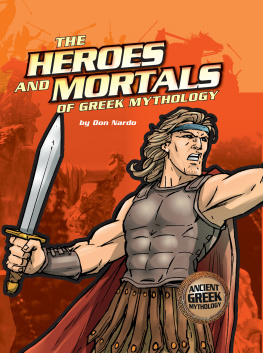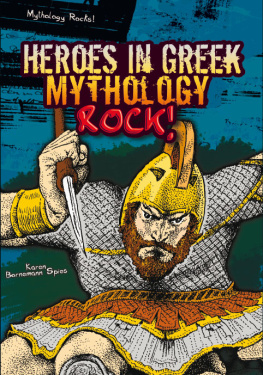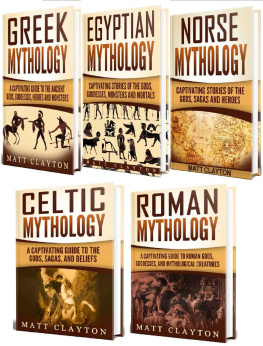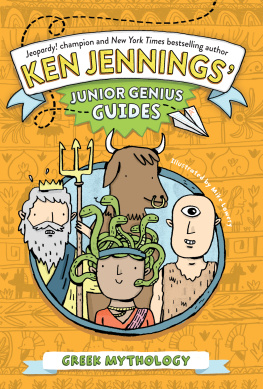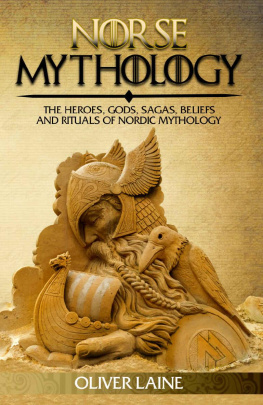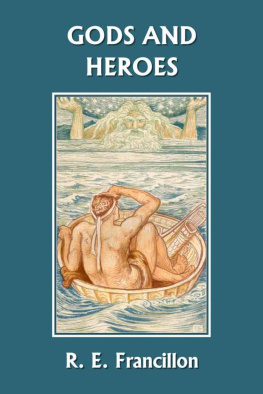
Gods, Demigods and Demons: An Encyclopedia of Greek Mythology
Bernard Evslin

For Tom and Bill
whose way of listening made wonder more wonderful
Note to the Rreader
THE KEYS TO PRONUNCIATION and principal sounds are those used in Scholastic Magazines classroom periodicals. For most readers they are easier to understand than the diacritical marks usually found in encyclopedias.
KEY TO PRONUNCIATION
The pronunciation of a word is indicated in parentheses following the word in the encyclopedia.
The system used translates each syllable into the nearest common English equivalent. (A syllable is several letters taken together so as to form one sound.) Short, familiar words are used occasionally to make the pronunciation of a syllable easier. These words are:
| dew | less |
| ice | sell |
| jay | urn |
| lay | us |
A syllable in capital letters is the syllable that is accented.
| Examples: | Lucretia | loo KREE shih uh |
| Leto | LEE toh |
| Saturn | SAT urn |
Often the unaccented syllable has the neutral sound, uh.
| Examples: | the a in sofa |
| the e in silent |
| the i in charity |
| the o in connect |
| the u in circus |
KEY TO PRINCIPAL SOUNDS:
| a | (as in add, cat) |
| ay | (as in hay, ale) |
| ah | (as in all, arm) |
| air | (as in hair, care, there) |
| aw | (as in soft) |
| ch | (as in chair) |
| ee | (as in Eve, eat, Lee) |
| eh | (as in end, hen, met) |
| g | (as in game, go, gone) |
| ih | (as in ill, is, into) |
| j | (as in jay, joke) |
| k | (as in ache, can, keep) |
| oh | (as in oh, old) |
| oo | (as in food, mood, rude, the owls oo, you) |
| or | (as in oar, or, orb) |
| ow | (as in out) |
| s or ss | (as in miss, this, us) |
| t | (as in at, Thomas, tin, Tom) |
| th | (as in thigh, thin) |
| u | (as in few, cube, use) |
| uh | (as in charity, circus, connect, silent, sofa) |
| ur | (as in lure, your) |
| y | (as in eye, high, pie) |
| z | (as in is, tease) |
A
Abas (AH buhs): An early king of Argos; great-grandfather of Perseus. He was a special favorite of Hera who blessed his shield, making it resistant to any sword-stroke. Thus favored by the goddess, Abas proved himself a fearsome warrior. His reputation persisted after his death, and the very sight of his shield, it is said, carried by one of his descendants, was enough to strike fear into the foes of Argos.
Acantha (uh KAN thuh): A nymph who disdained Apollo. Despite her refusals he kept pursuing her until she turned upon him and scratched his face. Enraged, he turned her into a thorny plant which we still know today as the acanthus.
Achelous (uhk uh LOH uhs): A river-god; son of Oceanus and Tethys. He competed with Heracles for the favor of the beautiful Deianira. Achelous transformed himself into a river and raged over his banks, trying to drown Heracles. When that failed, he turned into a serpent, and, finally, into a bull. But Heracles withstood all these metamorphoses, and hurled Achelous, senseless, to the ground. The defeated god slunk off to his underground springs but it is said that he still swells angrily in the springtime at the memory of his defeat, and spitefully floods the villages of the plain.
Achilles (uh KILL eez): Son of Peleus and Thetis, and the greatest of all Greek warriors. When Achilles was an infant his sea-goddess mother, wishing him to share her immortality, dipped him into the river Styx. However, in doing so, she held him by the heel, and the part of his heel covered by her thumb became his one vulnerable spot. Otherwise, his hide was stronger than any armor. He could not be wounded by any weapon wielded by man. Even without this magic hide, however, he would have been a most fearsome adversary. For no one whom he engaged in combat lived long enough to get a blow in. He was masterful with spear, sword, bow and arrow and, even weaponless, fighting with bare hands, he could disarm any foe. He could run faster than any horse except his own two immortal stallions. Yellow-haired, gray-eyed, thin-lipped, sleek-muscled, he was beautiful to look upon as he moved in the fatal ballet of sword-stroke and spear-thrust. His very appearance on the field struck his foes with terror. When he charged, even the bravest scattered like sheep. The gods themselves, it is said, were loath to meet him weapon in hand. Indeed, on the morning that he killed Hector, he first overcame the river-god Scamander. His feud with Agamemnon almost cost the Greeks the war. For Achilles refused to do any fighting so long as Agamemnon led the army. But Ulysses persuaded Achilles to lend his golden armor to his beloved friend, Patroclus, so that the Trojans, believing that Achilles had taken the field, would yield some of the ground they had won. Achilles agreed and Patroclus was slain by Hector, whereupon Achilles was moved to vengeance. He joined the battle, killed Hector, and turned the tide in favor of the Greeks. He did this despite the Fates decree that he would not outlive Hector by more than three days. Three days later he was ambushed by Hectors brother Paris, who sent an arrow into the tendon above his heel, his one vulnerable spot still called the Achilles tendon. The hero fell, but the tale of his deeds lives a stubborn life of its own, partaking of the immortality that Thetis meant to bestow upon her marvelous son.
Actaeon (uhk TEE uhn): A hunter unfortunate enough to glimpse the goddess Artemis bathing in the river. Angered at being seen in her nakedness by a mortal, the maiden goddess changed him into a stag. He was torn to pieces by his own hounds.
Adamanthea (ad uh man THEE uh): A nymph entrusted with the care of the infant Zeus. She concealed the new-born god among the olive groves which grew on the slopes of Mt. Ida so that he would be safe from his father, Cronus, who had formed the habit of devouring his children.
Admetus (ad MEE tuhs): A king of Thessaly whose herds were tended by the exiled Apollo. The king, ignorant that his new herdsman was a god, treated him, as he did all men, with great kindness. Apollo vowed that he would return the favor one day. When Admetus was called to an untimely death, Apollo intervened with the Fates, arguing his case so persuasively that the fatal crones broke their own rule. They agreed that Admetus might return to life if he could find someone to take his place among the dead. The wife of Admetus, the lovely Alcestis, eagerly volunteered. But she was rescued from death by Heracles, who also owed Admetus a favor, and who wished to measure his strength against the one opponent he had never met death. In all mythology, these two, Admetus and Alcestis, are perhaps the archetypes of the happily married each bringing to their union love, faithfulness, and a capacity for self-sacrifice.
Next page
